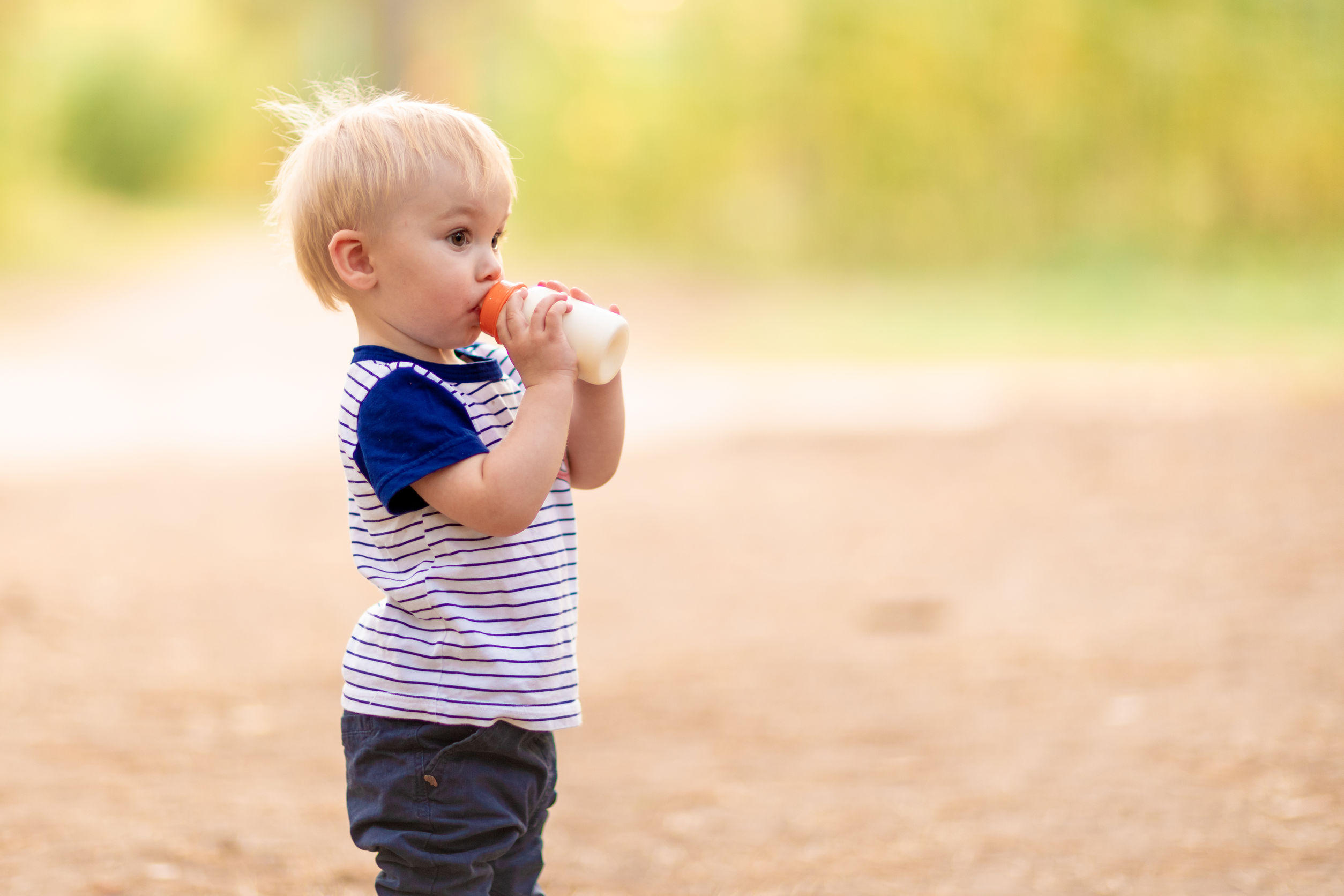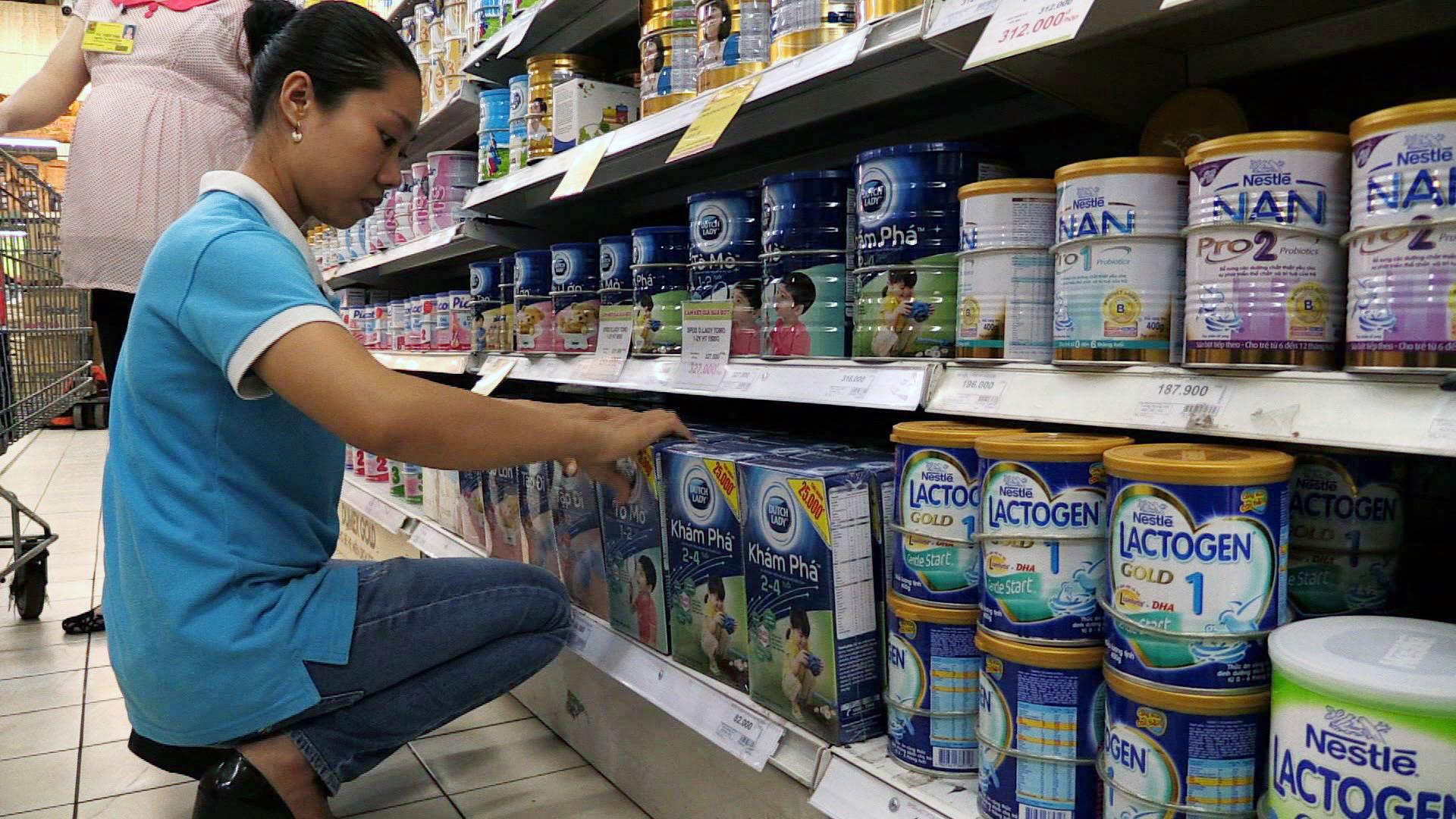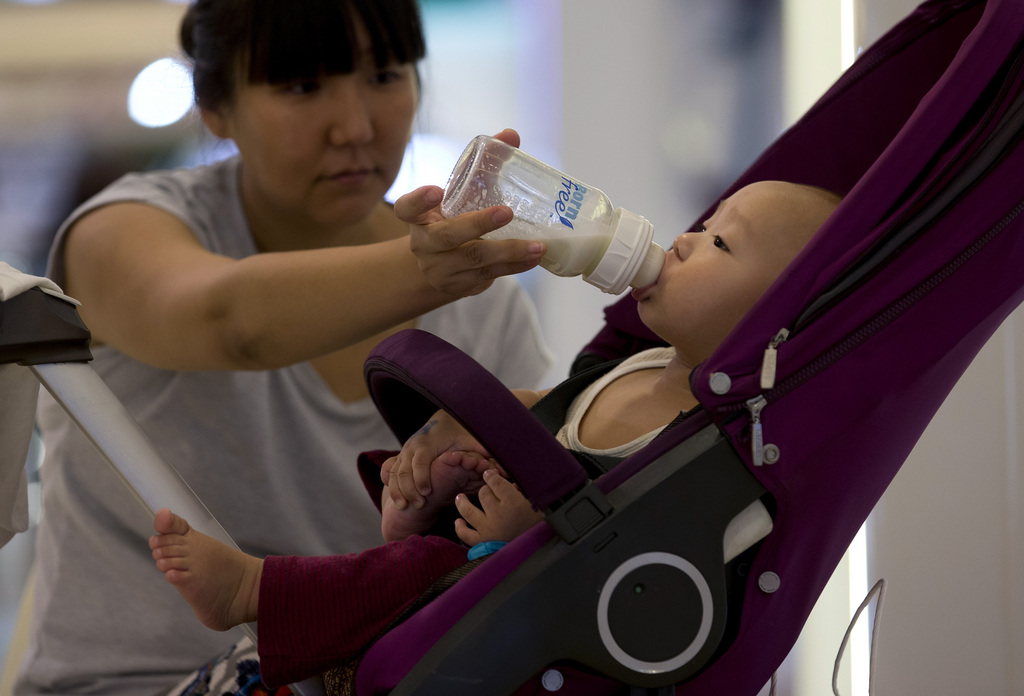Nestlé struggles to win over baby formula critics

For Nestlé, the Swiss food and beverage giant, diversifying its formula milk offerings harbours great promise. But industry critics are sceptical.
Weeks into his life, Lindsay Beeson’s son developed a rash, had blood in his nappies and suffered from diarrhoea and vomiting. Doctors determined he was allergic to cow milk.
Beeson, like countless other mothers in her situation, eliminated milk in her own diet and supplemented her breastmilk with hypoallergenic infant formula. When her son turned one, he moved on to a specially formulated milk for toddlers with allergies.
“I knew that with this he was getting the right balance of protein, fat and vitamins, just like cow’s milk,” she told swissinfo.ch. “And my son liked the taste.”
For big nutrition conglomerates like Nestlé, products like these, targeted at older babies with allergies, special dietary needs or simply picky eaters, are the next frontier in infant nutrition offerings.
“We want to address all babies, not just formula-fed babies,” Thierry Philardeau, Nestle’s head of nutrition, told a group of reporters at the company’s R&D operations in Lausanne. “All stages, all babies and all mums.”
In practical terms, the strategy is about filling nutritional gaps for mothers and babies whether they are exclusively formula-fed, breastfed, or a mix of both. While still focused on premature babies and those with specific medical needs, the Swiss multinational has been boosting R&D investment in the six-months-plus stage when breastmilk alone is no longer enough to meet a child’s nutritional needs.
Dividing lines
What Nestlé does affects the health of millions of children. More than 150 years after Henri Nestlé developed Farine Lactée, an infant cereal to help undernourished babies, Nestlé is the largest infant formula company in the world, capturing a fifth of the market, followed by Danone.
After rising breastfeeding rates in the past few decades cut into infant formula profits, the milk formula business is now booming. This is thanks in large part to growing-up milk, which generated the majority of global sales growth in 2018, according to EuromonitorExternal link.
Supermarkets in many parts of the world are now stocked with a range of powders and ready-made milk products and substitutes for children over one year.
But not everyone is happy about these products.
Some industry critics like Patti Rundall are crying foul. Rundall has been the policy director at Baby Milk Action since the 1980s, leading some of the biggest legal challenges against Nestlé’s formula business.
“Nestlé and Danone are leading the push for formulas and growing-up milks for children from 6 to 36 months and even upwards to nine years old,” she said. “They use the same branding as infant formula or very similar, so parents then see the logos for infant formula and think this is a whole trajectory.”
She believes the new product formulations are simply a marketing ploy. “All the follow-on formulas and the growing-up milks and junior milks, they’re just not necessary,” Rundall told swissinfo.ch.
“They should come off the market. But the market has become so huge, no one wants to do that, and they know it gets around the code.”
She is referring to the International Code of Marketing of Breastmilk SubstitutesExternal link from 1981 that set the standard for responsible marketing practices, including limits on public advertising, sponsorships and free samples of baby formula.
Its core message is that exclusive breastfeeding until six months is the best, something that both big companies like Nestlé and its critics agree on. Divisions emerge at the stage when other food and beverages can be introduced at around six months or later in life.
This period can be particularly confusing for parents as they often receive contradicting information from formula manufacturers, doctors and sceptics about what they should be feeding their children.
Some scientific studiesExternal link argue that what has been labelled “growing-up milk” for children between one and three years of age is not necessary but can compensate for nutritional deficiencies, particularly in cases of bad dietary habits or when certain nutrients are unavailable in local foods.
Industry nudge
The criticism of Nestlé is not out of nowhere. It’s been four decades since campaigners accused Nestlé of using aggressive marketing tactics that led mothers to abandon breastfeeding in favour of formula. The ensuing widespread boycott of Nestlé led to major changes in the marketing practices by big companies.
+ Read more about the infant milk scandal
Despite this, marketing continues to affect mothers’ choices. Catherine Watt from the Geneva chapter of La Leche League, a breastfeeding support group, says many women stop breastfeeding earlier than they would like.
Global standards on infant nutrition
The World Health Organization recommends that infants start breastfeeding within one hour of life, are exclusively breastfed for six months, with timely introduction of adequate, safe and properly fed complementary foods while continuing breastfeeding for up to two years of age or beyond.
The International Code on the Marketing of Breastmilk SubstitutesExternal link was published in 1981 and sets the standard for responsible practices by infant formula markers and distributors.
In 2016, the WHO released guidance on the inappropriate promotion of infant foodsExternal link where it clarified that breastmilk substitutes include any milks specifically marketed for children up to 3 years of age and therefore subject to the same restrictions as those for babies 6 months of age and younger.
As of April 2018, 136 out of 194 countries had some form of legal measure in place covering all, many or some provisions of the Code.
Codex has developed the technical standards on safety and labelling of both infant formula and follow-up formula.
“There is this insidious pressure from industry with all the advertising for different sorts of special food and milks,” she said. “If you have some niggling doubt whether you have enough milk supply and you have some formula in the cupboard, you’ll just try it.”
The consequences might be dire in developing countries. JP Dadhich, technical director of the Breastfeeding Promotion Network of India, is particularly concerned about the high costs of these products, their environmental impact and potential intrinsic contamination.
“We can’t be sure about the water quality mixed with these products, which increases the risk of diarrhoea in children. Moreover, animal milk is widely available, safe after boiling, and culturally accepted in India,” the paediatrician said. “It would be better for kids to eat good local, complementary foods while continuing breastfeeding after 6 months of age.”
The World Health Organization (WHO) has also expressed concernExternal link that products specifically targeting older infants could undermine nutrition and breastfeeding, especially if they use similar branding and are promoted as better alternatives, enriched with vitamins or minerals.
Devil in the detail
This has led to heated debates among governments and company lobbyists as to whether products designed for the stage beyond exclusive breastfeeding should be regulated as breastmilk substitutes and therefore be subject to the sector’s strict marketing restrictions.
“One difficulty in the discussions around revising the 1987 standard on follow-up formula has been whether products from 12-36 months should be considered breastmilk substitutes and what they should be called”, explains Tom Heilandt, Secretary of the Codex Alimentarius Commission, an international group setting food standards.
Some governments would like to ban them while others want to leave the choice to consumers. At the most recent Codex meetingExternal link in November, governments agreed to acknowledge in the standard that differences in the regulation of these products exist.
In some countries, adverts for infant formula have almost entirely disappeared, while adverts for toddler milks have dramatically increasedExternal link, the WHO notes. Some governments are clamping down. India, one of the more stringent, classifies any products labelled specifically for children two years of age or younger as breastmilk substitutes and thus subject to the Code.
Nestlé says it has gone further than many other industry players by applying the same marketing restrictions on products targeted at children up to one year of age, in line with European Union regulations that go into effectExternal link this year, while some others only focus on the period of exclusive breastfeeding.
But it rejects any additional regulation, arguing that based on studiesExternal link of what children actually eat in many countries, the alternative is likely to be less healthy. “There is no point in restricting advertising of products for children one year old when Coca-Cola and other products are given too early and there are no restrictions on them,” says Philardeau.
Trust deficit
Nestlé is aware that it must tread lightly into new territory given its past scandals. “It’s not like selling chocolate; you have a huge responsibility. We feed 15 million babies every year – that’s the size of Holland,” says Philardeau.
The company has updated its marketing policy several times, established a whistleblower system and reports annually on compliance. In contrast to the pre-1980s era, the company is also very clear in its communication that “breastfeeding is optimal” but that it wants to be the next best thing.
Industry critics say that it isn’t enough for Nestlé to be the “best of a bad bunch” in Rundall’s words. The company is still fending off accusations of deceptive nutrition claimsExternal link and sponsoring studiesExternal link with health professionals.
Nestlé argues that if it is pushed out of the market, companies with questionable track records will step in. This is especially true in weak regulatory environments such as in China, Russia and the US where a free-wheeling mentality among industry means that it is not uncommon for mothers to receive free formula samples in the mail, something even Nestlé bemoans. Some 58 countries still have no laws restricting the marketing of infant formula, according to the WHOExternal link.
“I want to be finished with this story of Nestlé killing babies,” says Philardeau. “Let’s move on but not forget what happened. We learned and we are different. I want to look at the history in front of us and not be penalised when we are doing more than many other people.”
Decoding infant nutrition
Infant formula: Breastmilk substitute specially manufactured to satisfy, by itself, the nutritional requirements of infants during the first months of life.
Follow‐up formula or follow-on formula: A food intended for use as a liquid part of the weaning diet for the infant from the sixth month on and for young children (12–36 months). It is a food prepared from the milk of cows or other animals and/or other constituents of animal and/or plant origin.
Growing‐up/Toddler milk: Growing‐up milks, ‘toddlers’ milks’ or similar products intended for children aged 1–3 years, usually to replace cows’ milk, include but are not limited to drinks based on cow, goat or sheep milk or originating from soy, rice, oats or almonds. It can include modification of the protein content and supplementary fatty acids, micronutrients or other substances with a potential nutritional effect. Source: Codex

In compliance with the JTI standards
More: SWI swissinfo.ch certified by the Journalism Trust Initiative













You can find an overview of ongoing debates with our journalists here . Please join us!
If you want to start a conversation about a topic raised in this article or want to report factual errors, email us at english@swissinfo.ch.